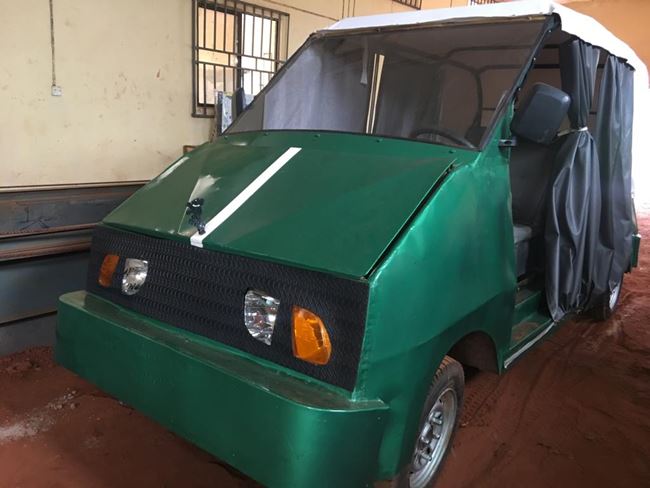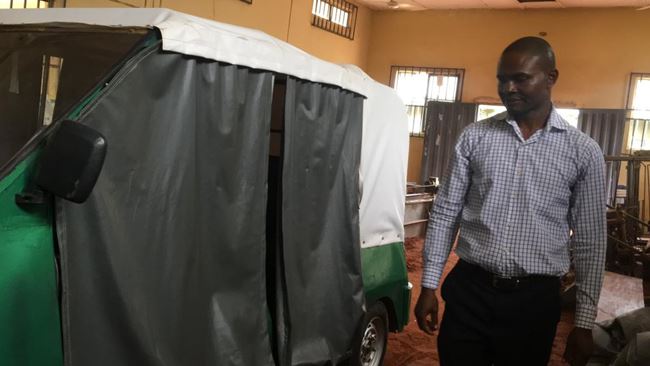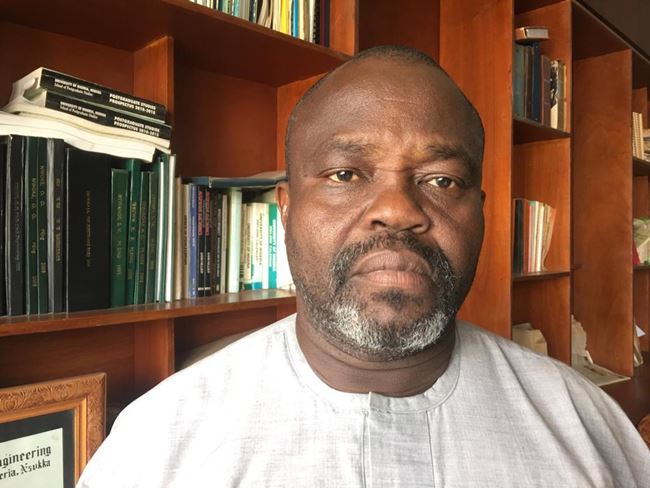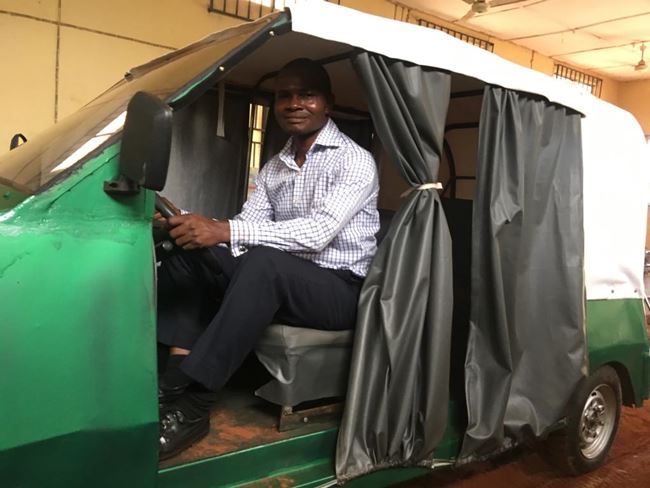SPECIAL REPORT… Nigeria set to join league of electric car producers? We visited UNN to see what is happening
The University of Nigeria Nsukka (UNN) has taken a giant first leap in Nigeria, to produce electric cars. PATRICK EGWU visited the school to uncover this innovation. In this story, he shares the dreams and plans of the initiators.
On June 8, a group of onlookers queue up the street at the University of Nigeria Nsukka (UNN) to witness an historic moment. It was the official launch and test-run of an electric car, developed and built by the institution.
The five-seater car, named Lion Ozumba 551, was made with 80 percent locally sourced materials and could undertake a 30-kilometre per hour distance when fully charged.
With this development, the University has become the first to produce an electric car in the country. The innovation was developed and built by a team of engineers, innovators and researchers from the engineering faculty of the institution.
“The design, conceptualization and fabrication of the vehicle took one month,” Engr. Ozoemena Ani, the head of the mechatronics group that produced the car says. “Everybody was under some heat because we needed to roll out and we were able to achieve this.
“The material cost of the car is estimated at N800,000 without taking labour and logistics into consideration,” he says.
Ani says the move that brought about the innovation was the formation of research groups in the University. In 2015, the University administration initiated the formation of research groups. In the beginning, they were less than 50 but within a short period of time grew to more than 200 groups and the mechatronics research group was one of the first.
“One of the focus research areas is electric vehicles and several research activities have been going on in the university before now uncoordinated,” Ani said. “We have 10 active members and about 17 associate members who include lecturers, technologists, staff members of the faculty, and university, especially the mechatronics department. We have both undergraduate and postgraduate students and a private sector fabricator welder.

The UNN electric car
“The unit cost will be cheaper once we go into mass production,” Prof Val Ekechukwu, the dean of the faculty says. “So we are looking at the fact that you could have this vehicle at N500,000 when it is fully commercialized. When you perfect the design, mass production will reduce your cost.”
The building process
In February, the National Automotive Design and Development Council [NADDC] had invited four institutions – the University of Nigeria, Nsukka, University of Lagos, Usman Danfodio University, Sokoto, the National Metrological Institute and Birnin Kebbi Polytechnic, to prepare a paper design and make proposals on how to produce electric cars, specifically for campus shuttles in the country. The NADDC was to evaluate the proposal and provide take-off funds to the institutions.
“The whole idea was that they [NADDC] were interested in research collaboration towards development and local manufacture of electric vehicles, specifically for campus shuttles using buses and cars,” Ani said. “So they challenged us first, to provide a kind of data saying the individual capacities of universities that were participating and part of what they wanted to know was what are we presently doing? What can we do and how soon can we do that? What kinds of support do we need?”
But before they were invited by the NADDC, sometime in 2018, Ani was in Michigan University in the United States where he worked with a team on electric solar recharged multi-function tractor for small holder farmers.
“After that, we wrote a proposal to the NADDC on funding to commercialize the equipment which was developed in the United States,” Ani said.
However, the NADDC didn’t provide the funding. So when the UNN delegation returned from the meeting, the former Vice-Chancellor of the institution, Prof Benjamin Ozumba provided a grant of N1.6 million and asked the team headed by Ani to begin the process of manufacturing the electric car.
“He challenged us to do something practical,” Ani says. “So we embarked on design, development and production of the prototype and we did that within four weeks.”
Due to the unavailability of materials, Ani and his team faced some challenges and at some point, had to improvise different materials used in building the car.
“Most of the power tools that we used were not readily available on campus and the ones that we used were not the modern ones,” he said. “We have had to improvise a lot of tools because they were not available. Then again, some of the components like the type of battery, because the major difference between the car we have produced and the ones everyone is driving is that the normal IC engine cars have engines that are powered through gasoline or diesel. But this one has no engine. The major source of power is battery and this battery is not anywhere available in Nigeria. So we even had to use the one we got around, which is not the real one that we were meant to use.”
Ani says “battery cost depends on the capacity. Even motor batteries have different capacities and sizes so the prices are different. When we were doing this work, we found that there were batteries of $1700 dollars, $2500 and even over $5000 dollars. So we couldn’t afford any of them so we had to settle for the ones we can find and that was solar batteries which are very common in the market.”

Ani… believes the invention can make waves with right support
According to Ani, the materials were not available because“nobody or few people are looking for it and traders will not import it because nobody will buy it. But we hope that if more activities start going on, traders will import them because somebody will buy them.”
Alternative to fuel cars
For a long time, the NADDC which was established in 2014 by as an agency under the federal ministry of trade and investment, has been trying to create an enabling environment for the manufacture of Nigerian made vehicles of international standards at competitive prices using local human and material resources.
The agency says this can be possible through an appropriate mix of protective measures, incentives, regulatory activities, and local content programmes.
“The most important thing is that this innovation has set aside the dreams of the NADDC to import electric cars in the country for campus shuttle,” Ekechukwu says.
“The major aim is to reduce the amount of pollution,” Ekechukwu said. “From a purely energy consideration, it is going to take a long while to stop using oil. In any case, how do you generate electricity? It’s through oil and gas, maybe hydro. So you still have to burn oil and gas to generate electricity. But the electric vehicle is clean and that’s what one can say on that. Does it conserve energy? I doubt, that is in purely energy consideration because you need to generate electricity, and for now you use a lot of oil and gas for electricity.”
The incremental results of this effort according to the NADDC, is to potentially generate large employment, transfer technology, boost transportation capacities, save foreign exchange and even bring about export to compliment the industrial policy of Nigeria.
“The whole idea is that the council is trying to take initiatives to see how Nigeria can key into the global trend of clean environment, less emission, less dependence on fossil fuels and of course the creation of jobs through innovation,” Ani said.
“Nigeria has for a long time depended on natural resources and this is not where the global trend is going. The richest men and countries are not depending on natural resources. They depend on innovation and technology. I think the council is trying to lead the nation in the direction of economy development through tech and innovation.”
Ani further added:
“So this whole thing was initially designed to be a pilot scheme for campus shuttle and from there we can develop more and more to mass production and local manufacture and commercialization.”
Perfecting innovation and future collaborations
The team says more works still need to be done to have a perfect innovation with the electric cars.
“We are now looking at improvements like the charging system, controls, even some mechanical devices just to perfect them,” Ekechukwu says. “The whole idea is to keep improving this design and other aspect of the car.”
Ekechukwu continues: “You can never say you have reached the end. You have to keep improving because even in the market, you keep improving on your design and keep receiving feedbacks from those who use it. It could be your break system that is not functioning as you so designed. But you keep developing and designing. So we are not resting on anything until we achieve this.”
Ekechukwu says perfecting the design will lead to future collaborations with key industry players and manufacturers.
“Once we perfect it, we are going to reach out to Innoson for partnership with us for further development on this and of course as you know, developments can keep happening, you never say it is done. Even big companies like Toyota is still producing and developing newer models and designs of their vehicles. But the most important story is that we have been able to roll out as the first ever electric vehicle manufactured in Nigeria with its component and recharging facilities.

Ekechukwu… Dean of the faculty
“We are not yet at the stage where we can ask investors to come in but in a short while, we will be able to sell the design to any local motor manufacturing company that is willing to mass produce them. In fact there is a Chinese company willing to partner with us but we want to explore all options.”
The University is also seeking approval to start an automotive engineering programme for students as a way of complimenting on the recent gains. The NADDC is collaborating with the institution in this regard and has promised support for laboratory facilities and other needed equipment for the take-off.
“Very soon we hope we can get to a stage where we can say we have a product and anybody who wants to take the patent from us to buy the rights to produce, we partner with him.”
On the issues of copyright, Ekechukwu says “The concept of electric cars is not entirely new but this particular model is ours and nobody is going to mass produce without our permission.”
Challenges to progress
Despite the prospects of the new electric car innovation, some setbacks might affect its progress going forward. In April, the Senate rejected a Bill for an Act to phase out petrol vehicles by 2035 and introduce electric cars. The Bill was earlier sponsored by former senator, Ben Murray-Bruce who said that in no distant time, combustive vehicles would be phased out.
The senate said as an oil producing country, Nigeria should do everything possible to frustrate the sale of electric cars to enable the sale of oil.
Bruce later dropped the bill but said the N1 trillion the country was spending annually on fuel subsidy would have been gone with the introduction of electric cars and the money instead channeled towards fixing education and infrastructure.
Ten years ago, the National Assembly [NASS] procured 15 electric cars worth millions of naira to supplement shuttle buses at NASS. But unfortunately, the cars which has a sitting capacity of 10 and 7 persons respectively, have not been put to use and are lying waste at the premises. Also, the charging points meant for the cars were never built.
Power supply is not regular in Nigeria and this becomes a challenge since the electric cars depend on electricity to be charged for use. For instance, during production, due to instability of power supply, the team had to partner with a private company that provided a generator to enable them meet the completion target date.
“Instability of power supply because putting on ground the product we have made requires the use of a lot of tools that are powered by electricity and all of us know the state of electricity in Nigeria which is a major problem,” Ani said.
To tackle the electricity issues, the team is planning to produce power points around the campus and major bus stops where drivers can pull over and recharge their battery when it is low before they continue their trip.
“The vehicle we just did is recharged by plugging to a socket connected to a national grid and the bigger plan is that we hope to build charging station – one connected to the national grid and the other solar-powered so that we could have stand-alone solar stations that could serve as an alternative. We are also hoping that Nigeria’s electricity situation will improve with time,” Ani explains.

Ani, inside the new innovation
But Ekechukwu says with charging points which will be created at various stations on campus, electricity won’t be a challenge.
“Electricity is not a thing to worry about,” he says. “Yes, it is a challenge but it’s not something to worry about. And the whole idea is that by the time you have many of these vehicles running on campus, you can then have charging points where you can run in, charge and go.”
However, despite these challenges, Ani is optimistic of the future of electric cars in the country.
“A lot of things are going to change where electric vehicles will replace the existing IC engines,” he says. “It is a reality that is going to happen. This was the same revolutions that happened with mobile phones.”
This report was funded by the Ripples Center for Data and Investigative Journalism



